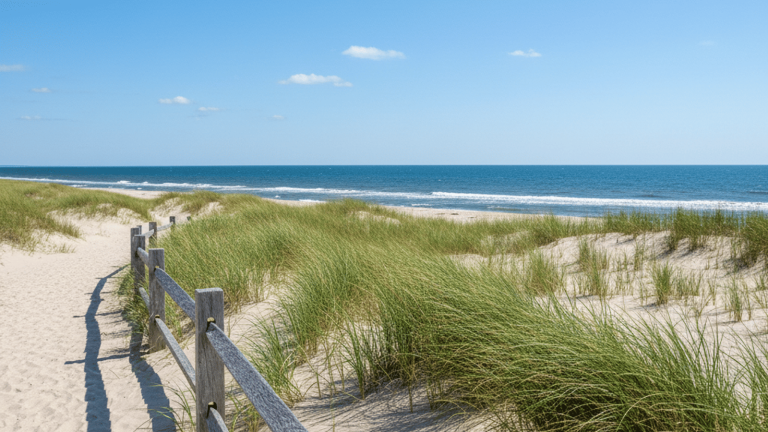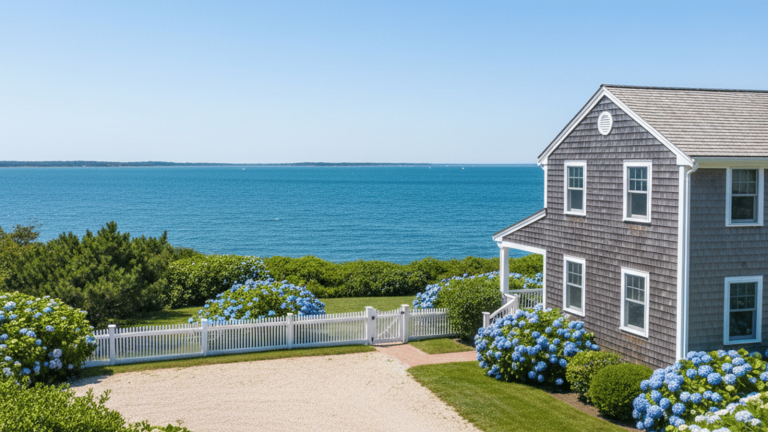Bourne is the Cape Cod gateway town that sits where the Cape Cod Canal meets Buzzards Bay. This guide breaks down the real costs a resident should consider, housing, taxes, utilities, groceries, transportation, and income, with recent, date-stamped figures and local context so you can estimate annual and monthly budgets.
Is It Expensive To Buy A Home In Bourne?
Homes for sale in Bourne lean expensive relative to the national average. The Zillow Home Value Index shows Bourne’s typical home value near the mid-to-upper $600k range and a median sale price reported at about $583,150 (May 2025).
That said, Bourne is not uniformly priced. Neighborhoods closer to the Cape Cod Canal, Sagamore, and Buzzards Bay often carry premium sale prices; pockets with smaller, older cottages or peripheral parcels (for example, parts of Pocasset and some Sagamore areas) can offer lower entry points.
Recent regional infrastructure decisions, notably the Sagamore/Bourne bridge replacement proposals and related eminent domain actions, add a local variable that can affect neighborhood supply and buyer confidence.
What is the Average Rent in Bourne?
Rents in Bourne are above the national average and vary by bedroom count and seasonality. Zillow’s rental index recorded average asking rent around $2,133 (Aug 2025).
Typical 1-bedroom rents often in the $1,700–$1,900 range and 2-bedrooms frequently $2,200–$2,500 depending on exact location and unit quality.
Seasonal pressure matters on Cape Cod: summer-season short-term demand pushes asking rents higher for furnished or weekly rentals, while steady year-round demand from local workers keeps core rental prices elevated even in winter. If you budget for housing as a renter, plan on a monthly rental estimate in the $1,800–$2,500 band for standard 1–2 bedroom units as a practical baseline.
What Are The Taxes in Bourne?
Massachusetts levies state income tax and sales tax, and local property taxes are set by the town. For homeowners the most immediate local number is the property tax rate: Bourne’s FY2025 residential tax rate is $7.81 per $1,000 of assessed value.
The town publishes details each fiscal year and also posts sewer user fees and related municipal charges; those line items can be material for year-round homeowners. For example, Bourne’s sewer user fee was $1,067 per unit for FY2025 and is billed annually by the town for properties on the municipal sewer system.
How High Are Property Taxes in Bourne?
Because the town’s tax rate is expressed per $1,000 of assessed value, the annual tax bill depends directly on assessed value. At a $600,000 assessed value, the FY2025 rate of $7.81 per $1,000 translates to roughly $4,686 in annual property tax.
Remember to factor in any special district charges or water district differentials; the town document lists separate water district rate add-ons for specific areas. Tax bills also fluctuate with town meeting approvals, capital projects, and changes in assessed values, so use the town assessor pages when you need the exact, parcel-level figure.
What Are the Average Monthly Utility Bills in Bourne?
Utility costs in Massachusetts are above the national average; final bills combine supply, delivery, and local user fees. Residential electric supply and delivery components vary by provider. In eastern Massachusetts basic supply rates have been in the mid-teens of cents per kWh in 2024–2025 and delivery charges add on top of that.
For Bourne specifically, expect typical monthly electricity and heating combined to run from roughly $150–$300 in mild months, and substantially higher (sometimes $300–$700+) in winter if you heat with oil or have older, less-efficient homes; the state’s winter fuel outlook and utility rate summaries give seasonal price guidance.
Water/sewer fees are a known local charge: the town’s sewer user fee was $1,067 per unit annually in FY2025, which effectively adds about $89 per month when averaged across the year for properties on the sewer system. That can be a material line item for household budgets.
How Much Should I Budget for Groceries in Bourne?
Groceries on Cape Cod trend slightly above the U.S. national average, reflecting transportation and seasonal supply impacts. Price-survey resources show typical grocery item costs in Bourne/Cape Cod that put grocery budgets modestly above national averages as of 2024–2025.
As a working estimate, a single adult who cooks most meals at home should budget roughly $300–$450 per month for groceries; a two-adult household might expect $600–$900 depending on shopping habits, dietary needs, and whether you lean on seasonal/local markets. Use grocery app price checks and local supermarket flyers to refine this for your household size and taste.
How Much Does Transportation Cost in Bourne?
Most Bourne residents rely on cars for daily travel. The Cape Cod Regional Transit Authority (CCRTA) runs fixed routes across the Cape, including a Bourne run that links Buzzards Bay with other local points, but service is not a full substitute for car ownership for many commutes or cross-Cape travel.
Fuel prices in Massachusetts have been around the low-to-mid $3.00 per gallon range in fall 2025; using that as a benchmark, drivers should estimate monthly fuel costs of roughly $150–$300 depending on commute distance and vehicle fuel efficiency.
Large regional projects such as the Sagamore and Bourne bridge replacements may affect freight patterns, peak-season congestion, and detour mileage during construction; those disruptions can translate to higher travel times and incremental fuel cost over multi-year projects.
What is the Median Household Income in Bourne?
Town-level median household income estimates vary by source and year. For Bourne town, most 2019–2023 aggregated estimates place median household income near $95,000
At the Barnstable County level, median household income estimates cluster around the low-to-mid $90,000 range, reflecting a county profile with higher seasonal/second-home ownership and a notable spread between wealthy enclaves and service-sector households.
What is the Recommended Income to Live In Bourne?
“Recommended” income depends on household size and housing choice. A common affordability rule is that housing costs should not exceed about 30% of gross income. In Bourne that translates to a recommended pre-tax household income of roughly $75,000–$160,000 depending on whether you rent a modest unit or purchase a median-priced home. Balance this against other costs, taxes, utilities, groceries, transportation, when you run your budget.
How Does the Cost of Living in Bourne Compare to the National Average?
Cape Cod and Barnstable County consistently score above the national cost-of-living baseline. County and region indices place Cape Cod 20–30% above the U.S. average overall, with housing and seasonal demand the primary drivers; grocery and utility indices are moderately above the national average as well.
In plain terms: expect to pay notably more for housing in Bourne than the national average, somewhat more for groceries and utilities, and roughly similar or slightly higher for transportation depending on how much you drive. If you compare Bourne to Boston’s metro, housing is still cheaper than central Boston in many segments, but it is expensive relative to many non-metro U.S. towns.
FAQs
Utilities in Massachusetts tend to be higher than national averages; electricity and winter heating season costs can push monthly combined utility bills well above national medians in colder months. Look at utility provider rate summaries and the state winter fuel outlook for the most current seasonal guidance.
Daily commuting by car to Boston is possible but long; many residents who work in metro Boston choose hybrid schedules or live closer to commuter rail nodes. Public transit options on the Cape are limited; CCRTA offers regional routes but they do not replace the convenience of a car for most daily commutes.
Summer visitors push up short-term rental rates, restaurant prices, and traffic during peak season. That seasonal inflation affects service wages and some goods and services pricing, and it can mean higher utility and maintenance costs for year-round owners who rent out property part-time.
Shopping local and seasonal often helps with produce prices; local farmers markets in season can lower produce costs compared with out-of-season supermarket items that carry shipping premiums. For a durable budget, plan higher grocery costs than many mainland towns and lean on local markets in summer.
Beyond taxes and utilities, Bourne bills for sewer user fees (FY2025: $1,067 per unit), possible water district differentials, and occasional special assessments tied to capital projects. Check the town’s assessor and sewer pages early in your planning.






